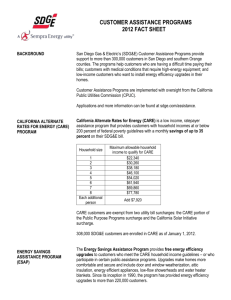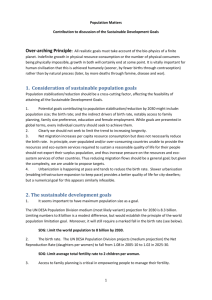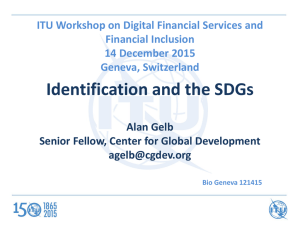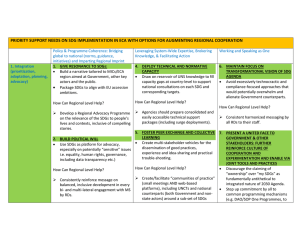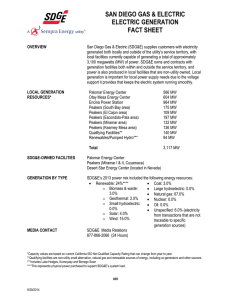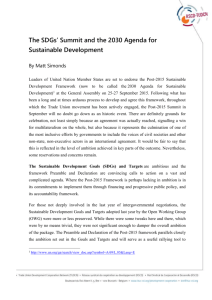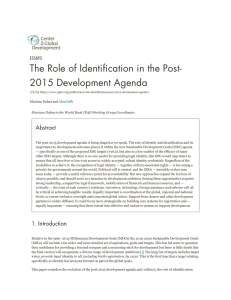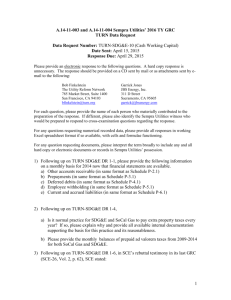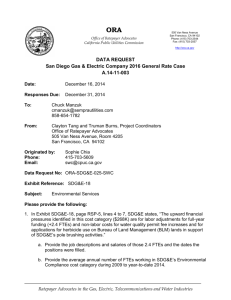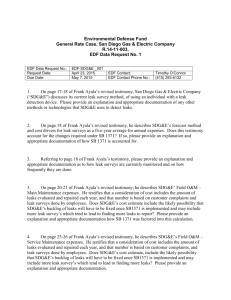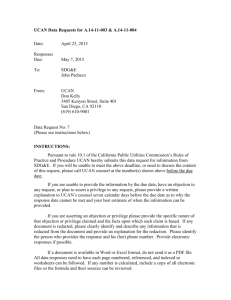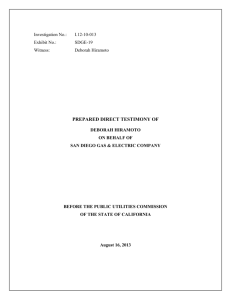How S&T can help operationalize an urban SDG
advertisement
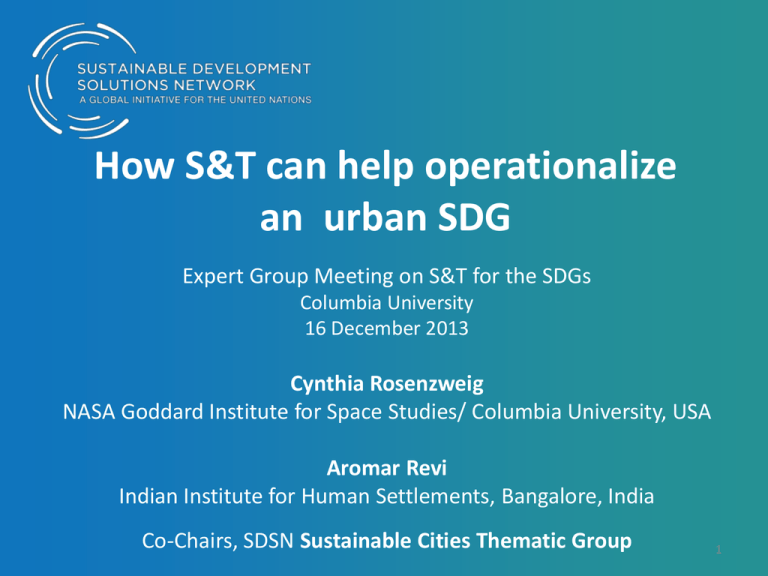
How S&T can help operationalize an urban SDG Expert Group Meeting on S&T for the SDGs Columbia University 16 December 2013 Cynthia Rosenzweig NASA Goddard Institute for Space Studies/ Columbia University, USA Aromar Revi Indian Institute for Human Settlements, Bangalore, India Co-Chairs, SDSN Sustainable Cities Thematic Group 1 Why the world needs an urban SDG? 2 Criteria for Successful SDGs 1. Guide public understanding of complex challenges 2. Mobilize key actors 3. Support effective public policies and private action 4. Be universal 5. Promote monitoring and accountability 3 SDSN Proposal for SDGs 1. 2. 3. End extreme poverty including hunger Achieve development within planetary boundaries Ensure effective learning for all children and youth for life and livelihood 4. Achieve gender equality, social inclusion, and human rights for all 5. Achieve health and wellbeing at all ages 6. Improve agriculture systems and raise rural prosperity 7. Empower inclusive, productive, and resilient cities 8. Curb human-induced climate change and ensure sustainable energy 9. Secure ecosystem services and biodiversity, and ensure good management of water and other natural resources 10. Transform governance for sustainable development 4 5 6 7 21st Century: Towards a New Governance Architecture • Re-balancing interests of: – – – – Nation States Local and Regional Governments Firms Rights of Communities and Citizens 8 Why the World Needs an SDG on Cities 1. Given that urbanization is now a globalscale process, a sustainable planet depends on how cities grow, function, and respond to stress. 2. Leaders and citizens of urban areas need to be empowered to mobilize sustainability action. 3. An Urban SDG would motivate public-private partnerships for measurable implementation. 4. If urban issues are ‘mainstreamed’ across the other SDGs, the role of cities will disappear. 5. An Urban SDG would promote linkages and strengthen other SDGs 9 Cities as First Responders: Mitigation and Adaptation Cities as First Responders: Mitigation and Adaptation 10 Proposed Urban SDG (2015-2030) Make all cities socially inclusive, economically productive, environmentally sustainable, secure, and resilient to climate change and other risks. Develop participatory, accountable, and effective city* governance to support rapid and equitable urban transformation. *and metropolitan region 11 Three Proposed Urban SDG Targets a. End extreme urban poverty, expand employment and productivity, and raise living standards, especially in slums. b. Ensure universal access to a well-designed, secure, and affordable built environment and basic urban services including housing; water, sanitation and waste management; low-carbon energy and transport; and mobile and broadband communication. c. Ensure safe air and water quality for all, and integrate reductions in greenhouse gas emissions, efficient land and resource use, and climate and disaster resilience into investments and standards. From these proposed targets, Urban Indicators are being developed via the Sustainable Cities Initiative in Accra, Bangalore, Durban, Rio de Janeiro & New York 12 Campaign for an Urban SDG #urbanSDG 1. 2. 3. 4. 5. Mobilizing urban governments worldwide Lobbying with national governments and groups Getting development finance institutions on board Orienting the private sector Promoting global citizens social media campaign 13 Operationalising an urban SDG: the case of Bangalore, India 14 Bangalore : 1992 3.4 million 3.4 million 1992 Bangalore : 2001 5.7 million 5.7 million 2001 3.4 million 1992 Bangalore : 2009 8.5 million 8.5 million 2009 5.7 million 2001 3.4 million 1992 18 Urban SDG Target A - Eliminate extreme urban poverty, expand employment & productivity, & raise living standards, especially in slums & informal settlements Population with incomes above national poverty line Households availaing Banking Services 100% 90% 80% 70% 60% 50% 40% 30% 20% 10% 0% Bangalore: indicative #urbanSDG set (work in progress, do not cite) Population not living in slums and informal settlements 1990 2000 2015 2030 BAU SDG Gender Wage Disparity Workforce Participation Rate Female Workforce Participation Gap 19 Urban SDG Target B - Ensure universal access to a secure and affordable built environment & basic services: housing, water, sanitation & waste management; low-carbon energy & transportation; & communication. Households with access to safe, sufficient drinking water Population living in adequate housing conditions 100% 90% 80% 70% 60% 50% 40% 30% 20% 10% 0% Bangalore: indicative #urbanSDG set (work in progress, do not cite) Households served by safe sanitation services 1990 2000 2015 2030 BAU Households and businesses with access to affordable and reliable low-carbon energy Households with access to internet SDG Households with access to cell phones 20 Urban SDG Target C - Ensure safe air & water quality for all, & integrate reductions in greenhouse gas emissions, efficient land & resource use, & climate & disaster resilience into investments & standards QualityofofDisater Disaster Quality Risk Management Management Bangalore: indicative #urbanSDG set (work in progress, do not cite) 1.00 0.80 Urban Green Cover 0.60 0.40 Quality of Climate Change Action 1990 0.20 2000 0.00 2015 Air AirQuality QualityIndex Index(Proportion of days in a year above minimum air quality standards) Normal Difference Vegetation Biodiversity Index/ NDVI Index (NDVI) from satellite data 2030 BAU SDG Water Quality Index Water Quality Indexto /Population with access unpolluted water 21 22
